英语作文—How to Enhance Etiquette Education
如何使教育更好英语作文
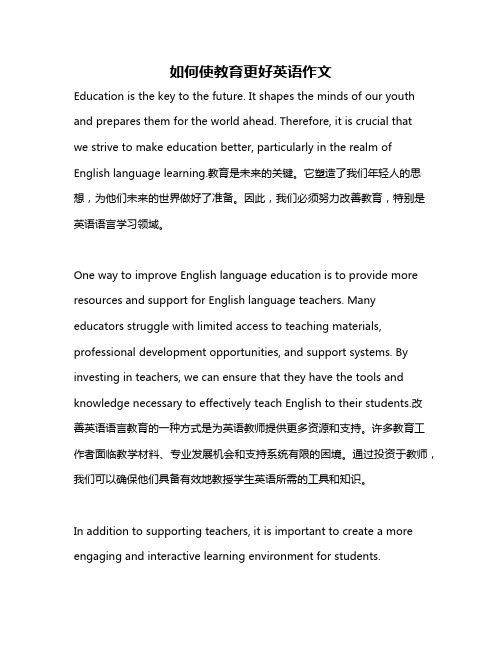
如何使教育更好英语作文Education is the key to the future. It shapes the minds of our youth and prepares them for the world ahead. Therefore, it is crucial thatwe strive to make education better, particularly in the realm of English language learning.教育是未来的关键。
它塑造了我们年轻人的思想,为他们未来的世界做好了准备。
因此,我们必须努力改善教育,特别是英语语言学习领域。
One way to improve English language education is to provide more resources and support for English language teachers. Many educators struggle with limited access to teaching materials, professional development opportunities, and support systems. By investing in teachers, we can ensure that they have the tools and knowledge necessary to effectively teach English to their students.改善英语语言教育的一种方式是为英语教师提供更多资源和支持。
许多教育工作者面临教学材料、专业发展机会和支持系统有限的困境。
通过投资于教师,我们可以确保他们具备有效地教授学生英语所需的工具和知识。
In addition to supporting teachers, it is important to create a more engaging and interactive learning environment for students.Traditional methods of language learning often focus on rote memorization and test-taking, which can be disengaging for students. Incorporating more project-based learning, group activities, and technology integration can make English language learning more enjoyable and effective.除了支持教师外,为学生创造更具吸引力和互动性的学习环境也很重要。
如何提升大学生综合素质的英语作文
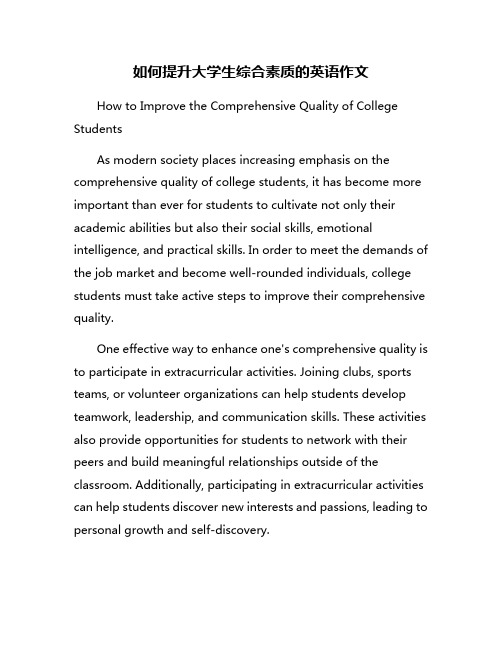
如何提升大学生综合素质的英语作文How to Improve the Comprehensive Quality of College StudentsAs modern society places increasing emphasis on the comprehensive quality of college students, it has become more important than ever for students to cultivate not only their academic abilities but also their social skills, emotional intelligence, and practical skills. In order to meet the demands of the job market and become well-rounded individuals, college students must take active steps to improve their comprehensive quality.One effective way to enhance one's comprehensive quality is to participate in extracurricular activities. Joining clubs, sports teams, or volunteer organizations can help students develop teamwork, leadership, and communication skills. These activities also provide opportunities for students to network with their peers and build meaningful relationships outside of the classroom. Additionally, participating in extracurricular activities can help students discover new interests and passions, leading to personal growth and self-discovery.Another important aspect of improving comprehensive quality is to focus on personal development. College students should take the time to reflect on their strengths and weaknesses, set goals for themselves, and work towards self-improvement. This can be achieved through activities such as reading self-help books, attending workshops and seminars, or seeking mentorship from experienced professionals. Developing a growth mindset and a willingness to learn from failure are key components of personal development.In addition to extracurricular activities and personal development, college students should also prioritize their mental and physical well-being. Maintaining a healthy lifestyle by eating nutritious foods, exercising regularly, and getting enough sleep is essential for overall well-being. Practicing mindfulness techniques, such as meditation or yoga, can help reduce stress and improve mental clarity. Seeking support from counselors or mental health professionals when needed is also important for maintaining psychological well-being.Furthermore, college students should make an effort to engage with diverse perspectives and experiences in order to broaden their horizons and cultivate empathy. This can be done by participating in cultural exchange programs, studying abroad,or volunteering in underserved communities. By embracing diversity and inclusivity, students can develop a greater understanding of the world around them and become more compassionate individuals.In conclusion, improving the comprehensive quality of college students requires a multifaceted approach that encompasses academic, social, emotional, and practical skills. By actively participating in extracurricular activities, focusing on personal development, prioritizing mental and physicalwell-being, and embracing diversity, college students can cultivate a well-rounded set of skills and qualities that will serve them well in both their personal and professional lives. It is never too late to start working on improving one's comprehensive quality, and the benefits of doing so are boundless.。
英文作文如何改善教育
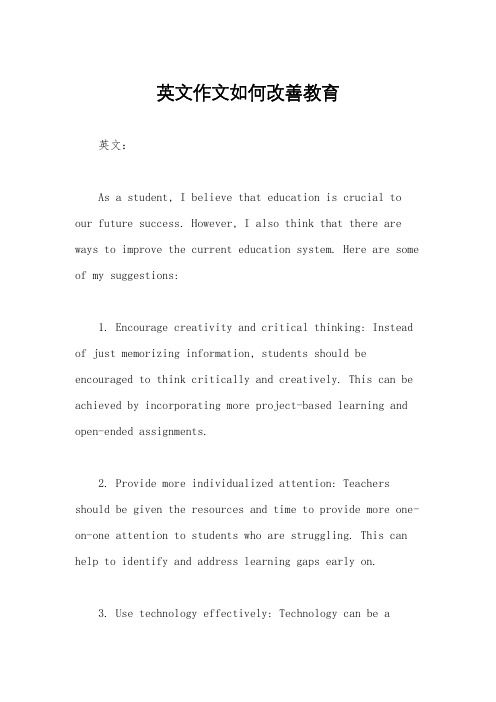
英文作文如何改善教育英文:As a student, I believe that education is crucial to our future success. However, I also think that there are ways to improve the current education system. Here are some of my suggestions:1. Encourage creativity and critical thinking: Instead of just memorizing information, students should be encouraged to think critically and creatively. This can be achieved by incorporating more project-based learning and open-ended assignments.2. Provide more individualized attention: Teachers should be given the resources and time to provide more one-on-one attention to students who are struggling. This can help to identify and address learning gaps early on.3. Use technology effectively: Technology can be apowerful tool in education, but it should be used in a way that enhances learning rather than replacing it. For example, online resources can be used to supplement classroom learning, but they should not replace face-to-face interaction with teachers.4. Foster a love of learning: Education should not be seen as a chore, but rather as a lifelong journey of discovery. Teachers should strive to create a positive and engaging learning environment that encourages students to explore their interests and passions.Overall, I believe that these changes can help tocreate a more effective and enjoyable education system for students.中文:作为一名学生,我认为教育对我们未来的成功至关重要。
英语作文如何改进教育质量

英语作文如何改进教育质量Improving the Quality of Education。
Education is the foundation of a nation's development and the key to individuals' success. Therefore, improving the quality of education is of great significance for both individuals and society. In this essay, I will discuss several ways to enhance the quality of education.Firstly, teachers play a crucial role in education, and their quality directly affects the quality of education. Therefore, it is necessary to improve the quality of teacher training and provide teachers with more professional development opportunities. For example, schools can organize regular teacher training sessions, invite experts to give lectures, and encourage teachers to participate in academic conferences. In addition, teachers should be encouraged to continue their education and pursue advanced degrees to improve their teaching skills.Secondly, the curriculum needs to be updated to meet the needs of the modern world. The curriculum should be designed to cultivate students' creativity, critical thinking, and problem-solving skills. It should also include courses on new technologies, environmental protection, and global issues. In addition, schools should offer extracurricular activities to enrich students' experiences and broaden their horizons.Thirdly, the classroom environment should be optimized to create a positive learning atmosphere. The classroom should be well-equipped with modern facilities, such as multimedia equipment and computers. Teachers should also adopt diverse teaching methods to cater to students' different learning styles. Moreover, schools should encourage students to participate in group discussions and group projects to enhance their communication and teamwork skills.Lastly, parents should be involved in their children's education. Schools should establish effective communication channels with parents and provide them with regularfeedback on their children's academic performance and behavior. Parents should also be encouraged to participate in school activities and provide support for theirchildren's learning at home.In conclusion, improving the quality of education requires the joint efforts of the government, schools, teachers, students, and parents. By enhancing teacher quality, updating the curriculum, optimizing the classroom environment, and involving parents in education, we can create a better learning environment and cultivate more talented individuals for the future.。
促进教育质量的英语作文
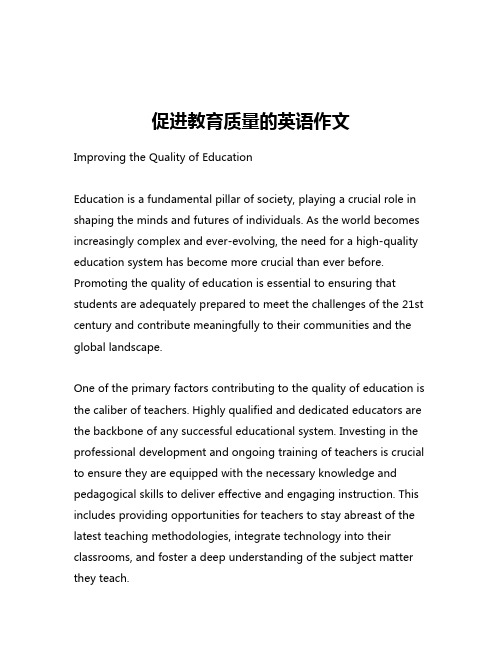
促进教育质量的英语作文Improving the Quality of EducationEducation is a fundamental pillar of society, playing a crucial role in shaping the minds and futures of individuals. As the world becomes increasingly complex and ever-evolving, the need for a high-quality education system has become more crucial than ever before. Promoting the quality of education is essential to ensuring that students are adequately prepared to meet the challenges of the 21st century and contribute meaningfully to their communities and the global landscape.One of the primary factors contributing to the quality of education is the caliber of teachers. Highly qualified and dedicated educators are the backbone of any successful educational system. Investing in the professional development and ongoing training of teachers is crucial to ensure they are equipped with the necessary knowledge and pedagogical skills to deliver effective and engaging instruction. This includes providing opportunities for teachers to stay abreast of the latest teaching methodologies, integrate technology into their classrooms, and foster a deep understanding of the subject matter they teach.Another key aspect of improving education quality is the implementation of a comprehensive and well-designed curriculum. A curriculum that is aligned with the evolving needs of society and the job market can ensure that students acquire the skills and knowledge necessary to thrive in the modern world. This may involve incorporating more interdisciplinary and project-based learning, emphasizing critical thinking and problem-solving skills, and integrating subjects such as science, technology, engineering, and mathematics (STEM) to prepare students for the demands of the21st-century workforce.Furthermore, the physical learning environment plays a significant role in the quality of education. Ensuring that schools are equipped with modern and well-maintained facilities, including up-to-date technology, well-stocked libraries, and suitable learning spaces, can greatly enhance the educational experience for students. Additionally, providing a safe and nurturing environment that fosters emotional well-being and supports the holistic development of students is essential for their academic and personal growth.Parental and community engagement is another crucial factor in promoting the quality of education. When families and local communities are actively involved in the educational process, it creates a strong support network for students and enhances theoverall educational experience. This involvement can take many forms, such as volunteering in schools, attending parent-teacher conferences, and participating in school-based decision-making processes.In addition to these factors, the use of data-driven decision-making is essential for improving the quality of education. By systematically collecting and analyzing student performance data, educators can identify areas of strength and weakness, tailor instructional strategies to meet individual student needs, and implement evidence-based interventions to address specific challenges. This data-driven approach allows for the continuous refinement and improvement of educational practices, ultimately leading to better outcomes for students.Moreover, the integration of technology in the classroom can significantly enhance the quality of education. Digital tools and resources can provide students with engaging and interactive learning experiences, facilitate personalized instruction, and foster the development of essential digital literacy skills. However, the effective integration of technology requires ongoing professional development for teachers and a strategic plan to ensure that technology is used in a purposeful and meaningful way.Finally, promoting a culture of continuous improvement andinnovation within the education system is crucial for enhancing the quality of education. Encouraging educators to explore new teaching methods, experiment with innovative practices, and share best practices can lead to the development of more effective and impactful educational approaches. This culture of innovation and collaboration can help drive the evolution of the education system to better meet the needs of students and prepare them for the challenges of the future.In conclusion, improving the quality of education is a multifaceted and ongoing process that requires the collective efforts of various stakeholders, including policymakers, administrators, educators, parents, and the broader community. By addressing factors such as teacher quality, curriculum design, learning environments, parental engagement, data-driven decision-making, technology integration, and a culture of continuous improvement, we can strive to provide students with a high-quality education that equips them with the knowledge, skills, and values necessary to thrive in the 21st century and beyond.。
如何提高礼仪教育英语作文
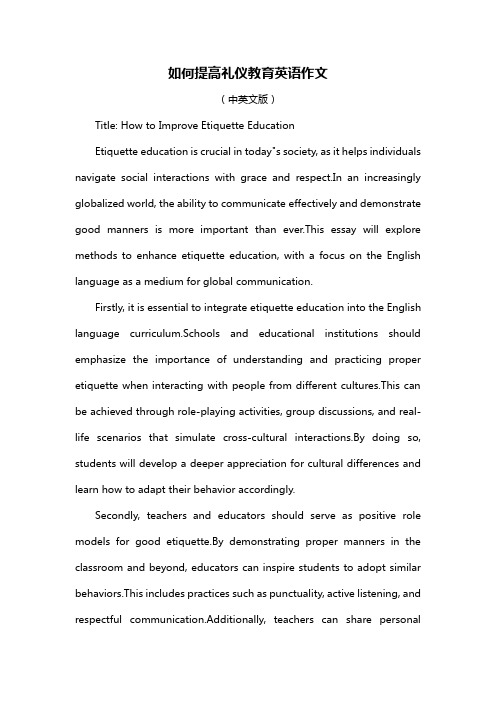
如何提高礼仪教育英语作文(中英文版)Title: How to Improve Etiquette EducationEtiquette education is crucial in today"s society, as it helps individuals navigate social interactions with grace and respect.In an increasingly globalized world, the ability to communicate effectively and demonstrate good manners is more important than ever.This essay will explore methods to enhance etiquette education, with a focus on the English language as a medium for global communication.Firstly, it is essential to integrate etiquette education into the English language curriculum.Schools and educational institutions should emphasize the importance of understanding and practicing proper etiquette when interacting with people from different cultures.This can be achieved through role-playing activities, group discussions, and real-life scenarios that simulate cross-cultural interactions.By doing so, students will develop a deeper appreciation for cultural differences and learn how to adapt their behavior accordingly.Secondly, teachers and educators should serve as positive role models for good etiquette.By demonstrating proper manners in the classroom and beyond, educators can inspire students to adopt similar behaviors.This includes practices such as punctuality, active listening, and respectful communication.Additionally, teachers can share personalanecdotes and experiences related to etiquette, helping students understand the practical applications of good manners in everyday life.Thirdly, utilizing technology and social media platforms can significantly contribute to etiquette education.In today"s digital age, many people interact primarily through written communication.Therefore, it is crucial to educate students on proper email etiquette, netiquette, and the use of social media platforms.By understanding the do"s and don"ts of digital communication, students can avoid misunderstandings and maintain respectful relationships online.Fourthly, involving parents and the community in etiquette education is vital.Parents play a crucial role in teaching their children basic manners and social norms.By collaborating with parents, schools can reinforce the importance of etiquette education and ensure consistent messaging across different environments.Additionally, community workshops and events can provide opportunities for individuals of all ages to learn and practice good manners together.Lastly, incorporating cultural sensitivity into etiquette education is essential.As the world becomes more interconnected, it is crucial to understand and respect cultural differences in social norms and behaviors.Students should be exposed to various cultures through literature, guest speakers, and field trips.This will help them developempathy and adaptability, enabling them to navigate diverse social settings with ease.In conclusion, improving etiquette education is vital in fostering well-rounded individuals who can effectively navigate social interactions.By integrating etiquette into language education, modeling good behavior, utilizing technology, involving parents and the community, and promoting cultural sensitivity, we can create a generation of individuals who possess the skills necessary to succeed in an increasingly interconnected world.。
英文作文如何改善教育
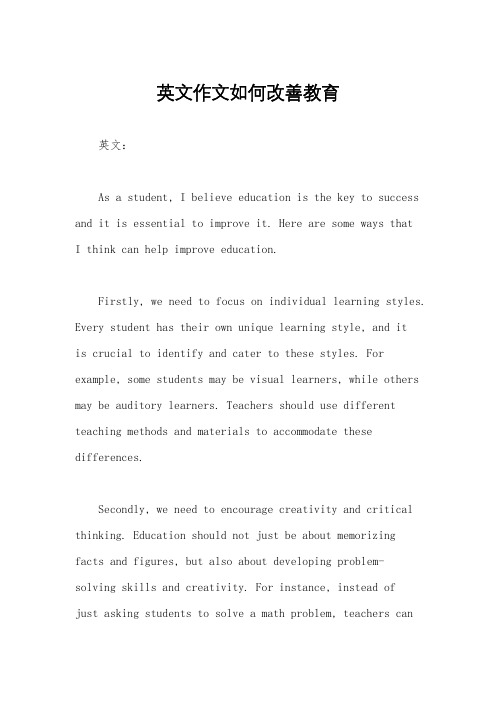
英文作文如何改善教育英文:As a student, I believe education is the key to success and it is essential to improve it. Here are some ways thatI think can help improve education.Firstly, we need to focus on individual learning styles. Every student has their own unique learning style, and itis crucial to identify and cater to these styles. For example, some students may be visual learners, while others may be auditory learners. Teachers should use different teaching methods and materials to accommodate these differences.Secondly, we need to encourage creativity and critical thinking. Education should not just be about memorizingfacts and figures, but also about developing problem-solving skills and creativity. For instance, instead ofjust asking students to solve a math problem, teachers canask them to come up with a real-life scenario where the problem can be applied.Thirdly, we need to provide more practical learning opportunities. Students should have the chance to applywhat they have learned in real-life situations. For example, instead of just learning about marketing strategies in a classroom, students can work on a marketing project for a local business.Lastly, we need to invest in teachers. Teachers are the backbone of education, and it is essential to provide them with the necessary resources and training. For instance, teachers can attend workshops and conferences to learnabout new teaching methods and technologies.中文:作为一名学生,我相信教育是成功的关键,因此改善教育非常重要。
如何提高礼仪教育英语作文

Enhancing Etiquette Education: A Necessary Pursuit in Modern SocietyIn today's interconnected and culturally diverse world, the importance of etiquette education cannot be overstated. Etiquette, or the code of civilized behavior, is anintegral part of social interactions and plays a pivotalrole in shaping an individual's character and overall image. It is a critical aspect of personal and professional growth, influencing how we interact with others, conduct ourselvesin public, and represent our culture and values. Therefore, enhancing etiquette education is a necessary pursuit in modern society.Firstly, etiquette education helps individuals to understand and appreciate the importance of respect and consideration for others. It teaches us to be mindful ofour actions and words, ensuring that we do not infringeupon the rights or sensibilities of others. By practicing polite behavior, we can foster a more harmonious and inclusive social environment, where everyone feels valued and respected.Secondly, etiquette education enhances personal growth and development. It cultivates qualities such as self-discipline, confidence, and poise, which are essential for success in both personal and professional life. By mastering the nuances of polite behavior, individuals can effectively navigate different social settings, making positive impressions and building strong relationships.Moreover, etiquette education is crucial for promoting cultural understanding and harmony. In a globalized world, where people from diverse cultures interact frequently, understanding and respecting the etiquette of other cultures is essential. By practicing polite behavior that is sensitive to cultural differences, we can foster mutual understanding and respect, bridging cultural divides and promoting global harmony.To enhance etiquette education, several strategies can be employed. Firstly, parents and educators should model polite behavior and instill the values of respect and consideration for others in children from a young age. Secondly, schools and institutions should integrate etiquette education into their curricula, providingstudents with the knowledge and skills necessary tonavigate different social settings. Additionally, communities and organizations can organize workshops and seminars on etiquette, allowing individuals to learn and practice polite behavior in a structured environment.In conclusion, etiquette education is an essential component of personal and professional growth. It fosters respect and consideration for others, enhances personal development, and promotes cultural understanding and harmony. By enhancing etiquette education in our society,we can cultivate a more civilized and inclusive environment, where everyone is treated with dignity and respect.**提升礼仪教育:现代社会中的必要追求**在当今相互联系且文化多元的世界中,礼仪教育的重要性不言而喻。
如何使教育更好英语作文
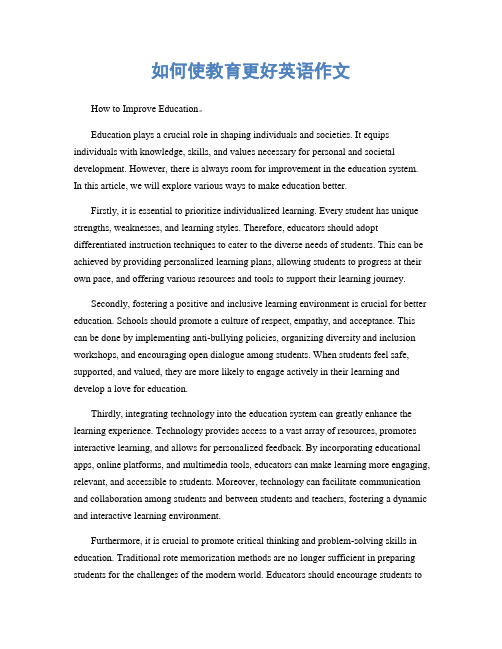
如何使教育更好英语作文How to Improve Education。
Education plays a crucial role in shaping individuals and societies. It equips individuals with knowledge, skills, and values necessary for personal and societal development. However, there is always room for improvement in the education system.In this article, we will explore various ways to make education better.Firstly, it is essential to prioritize individualized learning. Every student has unique strengths, weaknesses, and learning styles. Therefore, educators should adopt differentiated instruction techniques to cater to the diverse needs of students. This can be achieved by providing personalized learning plans, allowing students to progress at their own pace, and offering various resources and tools to support their learning journey.Secondly, fostering a positive and inclusive learning environment is crucial for better education. Schools should promote a culture of respect, empathy, and acceptance. This can be done by implementing anti-bullying policies, organizing diversity and inclusion workshops, and encouraging open dialogue among students. When students feel safe, supported, and valued, they are more likely to engage actively in their learning and develop a love for education.Thirdly, integrating technology into the education system can greatly enhance the learning experience. Technology provides access to a vast array of resources, promotes interactive learning, and allows for personalized feedback. By incorporating educational apps, online platforms, and multimedia tools, educators can make learning more engaging, relevant, and accessible to students. Moreover, technology can facilitate communication and collaboration among students and between students and teachers, fostering a dynamic and interactive learning environment.Furthermore, it is crucial to promote critical thinking and problem-solving skills in education. Traditional rote memorization methods are no longer sufficient in preparing students for the challenges of the modern world. Educators should encourage students tothink critically, analyze information, and apply knowledge to real-life situations. This can be achieved through project-based learning, case studies, and open-ended discussions. By nurturing these skills, students will be better equipped to navigate complex issues and contribute to society.In addition, education should not be limited to the classroom. Experiential learning opportunities, such as field trips, internships, and community service, can greatly enrich the educational experience. These real-world experiences provide students with practical skills, expose them to different perspectives, and foster a sense of civic responsibility. By bridging the gap between theory and practice, students can better understand the relevance and application of their education in the real world.Lastly, continuous professional development for educators is essential to improve education. Teachers should have access to ongoing training, workshops, and resources to enhance their teaching methods and stay updated with the latest educational trends. By investing in the professional growth of teachers, schools can ensure that students receive high-quality education and benefit from innovative teaching practices.In conclusion, there are several ways to make education better. By prioritizing individualized learning, fostering a positive and inclusive environment, integrating technology, promoting critical thinking, providing experiential learning opportunities, and investing in continuous professional development for educators, we can create a more effective and meaningful education system. Education is the key to a brighter future, and it is our collective responsibility to ensure that it is accessible, engaging, and empowering for all.。
关于提高教育质量 英语短文

关于提高教育质量英语短文Education is a cornerstone of individual growth and societal progress. It imparts knowledge, nurtures skills, and fosters critical thinking. However, to enhance the quality of education, it is imperative to focus on several key aspects.教育是个人成长和社会进步的基石。
它传授知识,培养技能,并促进批判性思维。
然而,要提高教育质量,我们必须关注几个关键方面。
Firstly, the recruitment and retention of qualified teachers are paramount. Teachers should possess not only subject-matter expertise but also the ability to inspire and motivate students. Additionally, ongoing professional development opportunities should be provided to keep teachers updated with the latest educational practices and technologies.首先,招募和留住合格教师至关重要。
教师不仅应具备学科专业知识,还应具备激励和激发学生的能力。
此外,还应提供持续的专业发展机会,以使教师了解最新的教育实践和技术。
Secondly, a student-centered approach to teaching is essential. This involves tailoring instruction to meet the individual needs of students, promoting active learning, and encouraging critical thinking. By doing so, students become more engaged and motivated, leading to improved academic performance and a deeper understanding of the subjectmatter.其次,以学生为中心的教学方法至关重要。
英语作文如何提升教育质量

Improving the quality of education is a multifaceted endeavor that requires a comprehensive approach. Here are several strategies that can be employed to enhance the educational experience for students:1. Professional Development for Teachers: Regular training and professional development opportunities for teachers can help them stay current with the latest teaching methodologies and technologies. This can lead to more effective and engaging classroom practices.2. Smaller Class Sizes: Reducing the studenttoteacher ratio allows for more individualized attention, which can be particularly beneficial for students who may need extra help or who have unique learning styles.3. Technology Integration: Incorporating technology into the classroom can provide students with access to a wealth of information and interactive learning tools. This can also help prepare students for the digital world they will encounter in their future careers.4. Culturally Responsive Teaching: Educators should strive to create an inclusive learning environment that respects and incorporates the diverse backgrounds and experiences of all students. This can help to foster a sense of belonging and increase engagement.5. Regular Assessment and Feedback: Implementing a system of continuous assessment allows teachers to monitor student progress and provide timely feedback. This can help students to understand their strengths and areas for improvement.6. Parental Involvement: Encouraging parents to take an active role in their childs education can lead to better communication between home and school, and can provide additional support for students.7. Curriculum Relevance: Ensuring that the curriculum is relevant and engaging to students is crucial. This includes updating content to reflect current events and societal changes, as well as incorporating realworld applications of academic concepts.8. Student Voice: Giving students a voice in their education, such as through student councils or feedback mechanisms, can help schools understand their needs and preferences, leading to a more studentcentered approach.9. Mental Health Support: Providing resources and support for students mental health can create a more conducive learning environment. This includes counseling services andstress management workshops.10. Extracurricular Activities: Offering a variety of extracurricular activities can help students explore their interests and passions outside of the traditional academic setting, contributing to a wellrounded education.11. Community Partnerships: Collaborating with local businesses, nonprofits, and community organizations can provide students with realworld experiences and opportunities for mentorship and internships.12. Safe and Supportive Environment: Creating a safe and supportive school environment where students feel respected and valued is essential for fostering a positive learning atmosphere.By implementing these strategies, educational institutions can work towards enhancing the quality of education they provide, ultimately preparing students for success in their future endeavors.。
如何提高大学生综合素质英语作文开头
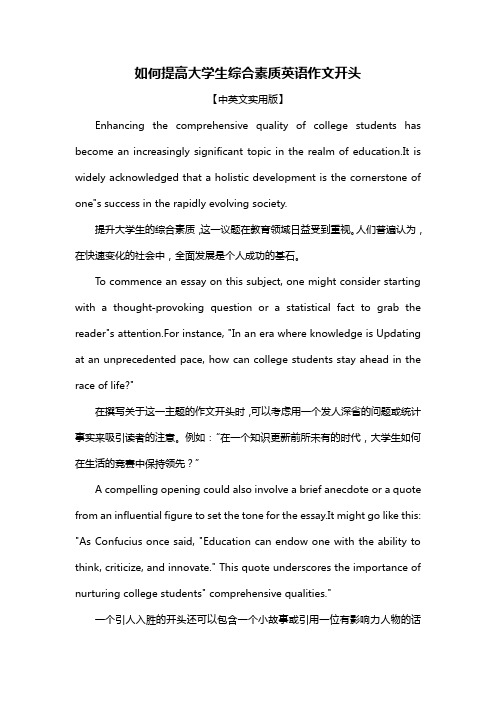
如何提高大学生综合素质英语作文开头【中英文实用版】Enhancing the comprehensive quality of college students has become an increasingly significant topic in the realm of education.It is widely acknowledged that a holistic development is the cornerstone of one"s success in the rapidly evolving society.提升大学生的综合素质,这一议题在教育领域日益受到重视。
人们普遍认为,在快速变化的社会中,全面发展是个人成功的基石。
To commence an essay on this subject, one might consider starting with a thought-provoking question or a statistical fact to grab the reader"s attention.For instance, "In an era where knowledge is Updating at an unprecedented pace, how can college students stay ahead in the race of life?"在撰写关于这一主题的作文开头时,可以考虑用一个发人深省的问题或统计事实来吸引读者的注意。
例如:“在一个知识更新前所未有的时代,大学生如何在生活的竞赛中保持领先?”A compelling opening could also involve a brief anecdote or a quote from an influential figure to set the tone for the essay.It might go like this: "As Confucius once said, "Education can endow one with the ability to think, criticize, and innovate." This quote underscores the importance of nurturing college students" comprehensive qualities."一个引人入胜的开头还可以包含一个小故事或引用一位有影响力人物的话来为全文定下基调。
促进教育质量的英语作文
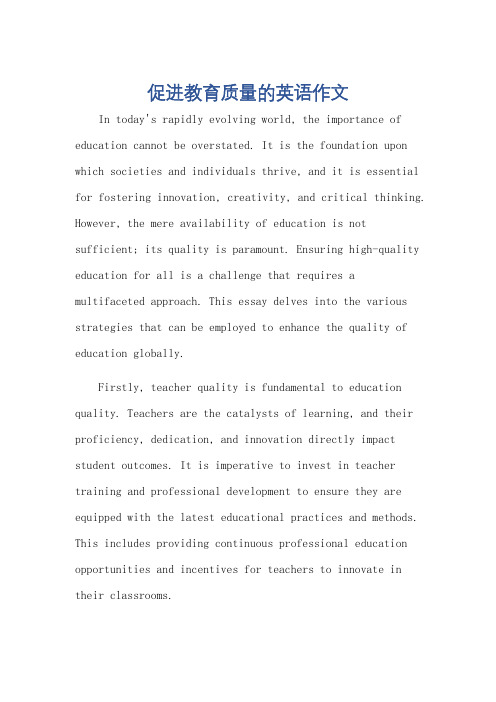
促进教育质量的英语作文In today's rapidly evolving world, the importance of education cannot be overstated. It is the foundation upon which societies and individuals thrive, and it is essential for fostering innovation, creativity, and critical thinking. However, the mere availability of education is not sufficient; its quality is paramount. Ensuring high-quality education for all is a challenge that requires amultifaceted approach. This essay delves into the various strategies that can be employed to enhance the quality of education globally.Firstly, teacher quality is fundamental to education quality. Teachers are the catalysts of learning, and their proficiency, dedication, and innovation directly impact student outcomes. It is imperative to invest in teacher training and professional development to ensure they are equipped with the latest educational practices and methods. This includes providing continuous professional education opportunities and incentives for teachers to innovate in their classrooms.Moreover, technological advancements have the potential to significantly improve education quality. The integration of digital tools and platforms can personalize learning experiences, making them more engaging and effective. For instance, adaptive learning technologies can tailor educational content to individual student needs, while online resources provide access to a wealth of information beyond traditional textbooks. Additionally, virtual reality and augmented reality can create immersive learning environments that foster creativity and critical thinking. Curriculum design is another crucial aspect of enhancing education quality. Curriculums should be comprehensive, inclusive, and up-to-date, reflecting the diverse needs and interests of students. They should encourage critical thinking, problem-solving, and collaboration, rather than focusing solely on rote learning and memorization. Furthermore, curriculums should prepare students for the real-world challenges they will encounter, equipping them with the necessary skills and knowledge.In addition, assessment and evaluation methods must evolve to align with changing educational goals.Traditional assessments often focus on evaluating student knowledge rather than their ability to apply that knowledge in practical situations. Alternative assessment techniques, such as project-based learning and performance assessments, can better measure students' understanding and problem-solving abilities.Moreover, a culture of continuous improvement and feedback is essential for enhancing education quality. Regular surveys and feedback mechanisms should be established to gather student, teacher, and parent perspectives on the educational system. This feedback can inform improvements in curriculum, teaching methods, and school policies, ensuring that education remains responsive to the needs of the community.Finally, education systems must prioritize equity and inclusivity. Ensuring that all students, regardless oftheir background or circumstances, have access to high-quality education is crucial. This requires addressing issues such as educational disparities, access to resources, and the quality of educational facilities.In conclusion, enhancing the quality of education is a complex task that requires a holistic approach. Investing in teacher quality, leveraging technological advancements, redesigning curriculums, adopting alternative assessment techniques, fostering a culture of continuous improvement, and prioritizing equity and inclusivity are all essential steps. By taking these measures, we can ensure that education not only remains relevant but also serves as a powerful tool for societal progress and individual fulfillment.**提升教育质量:多元化的方法**在当今快速变化的世界中,教育的重要性不言而喻。
如何提高大学生综合素质英语作文开头

如何提高大学生综合素质英语作文开头As a college student, it is crucial to enhance one's comprehensive abilities in order to succeed both academically and professionally. English composition playsa significant role in developing these skills, as itrequires critical thinking, effective communication, and creativity. In this essay, we will explore different approaches to crafting engaging introductions for English compositions, with the aim of capturing the readers' attention and setting the tone for the rest of the essay.作为大学生,提高综合素质对于在学术和职业上的成功至关重要。
英语作文在培养这些能力方面起着重要作用,因为它要求批判性思维、有效沟通和创造力。
本文将探讨不同的方法来撰写引人入胜的英语作文开头,旨在引起读者的注意并为文章的其他部分定下基调。
One way to start an English composition is by using a thought-provoking question or an interesting fact relatedto the topic. This approach immediately grabs the reader's attention and stimulates their curiosity. For example, when discussing the impact of technology on society, you couldbegin with a question such as: "Have you ever wondered how our lives would be without smartphones?" or share an intriguing statistic like: "Did you know that more people own a mobile phone than a toothbrush?"一种开始英语作文的方式是使用一个发人深省的问题或与话题相关的有趣事实。
如何提升自己的文明素养英语作文

如何提升自己的文明素养英语作文In the tapestry of our global village, the thread of civility weaves through the fabric of society, binding us together in a common pursuit of respect and understanding. Cultivating one's civility is not merely an act of personal growth but a collective endeavor that enhances the harmony of our communities. So, how can we elevate our own levels of civility and contribute positively to the world around us?First and foremost, embracing a mindset of lifelong learning is crucial. By continually seeking knowledge and understanding diverse perspectives, we can broaden our horizons and develop empathy for others. Engaging in cultural exchanges, reading widely, and attending lectures or seminars can all serve to enrich our intellectual and emotional landscapes.Moreover, practicing active listening is a cornerstone of civility. When we genuinely listen to others, we demonstrate respect and foster a two-way dialogue that can lead to deeper connections and mutual understanding. This involves not only hearing the words spoken but also interpreting the emotions and intentions behind them.Another effective way to enhance our civility is through the practice of mindfulness. Being present and aware of our actions and their impact on others can help us to act with kindness and consideration. Mindfulness can also assist inmanaging our emotions, preventing impulsive reactions thatmay harm our relationships with others.In addition, embracing etiquette and social norms is essential. Understanding and adhering to the unwritten rulesof conduct in various social settings can prevent misunderstandings and show respect for the cultural norms of others. This can be achieved by educating ourselves ondifferent etiquette practices and being observant of thesocial cues around us.Furthermore, volunteering and participating in community service are powerful ways to develop our civility. By giving back to society, we not only help those in need but also cultivate a sense of responsibility and compassion. These experiences can be incredibly humbling and enlightening, teaching us the value of service and the importance oftreating everyone with dignity.Lastly, modeling civil behavior is perhaps the most impactful way to promote civility. As we lead by example, we inspire others to follow suit, creating a ripple effect of positive change. By treating everyone we encounter with kindness, respect, and fairness, we can help to foster a more civil and harmonious society.In conclusion, the journey of enhancing our civility is a personal and ongoing one. It requires a commitment to self-improvement, an openness to learning, and a genuine desire to contribute to the well-being of others. By taking these steps,we can elevate not only our own civility but also contribute to a more respectful and understanding world.。
个人加强教育提升素质英语作文

个人加强教育提升素质英语作文Personal efforts to enhance education and improve quality are crucial for self-development. Here are some ways individuals can strengthen their education and enhance their overall quality.Firstly, setting clear goals is essential for personal growth. By identifying areas of weakness and determining what you want to achieve, you can create a roadmap to guide your education and improvement. This could involve making a list of specific skills or knowledge you want to acquire, such as fluency in a foreign language or proficiency in a specific subject.Secondly, developing good study habits is key to effective learning. This includes creating a conducive study environment, managing time efficiently, and adopting active learning strategies. By setting aside dedicated study time, eliminating distractions, and using techniques such as note-taking and summarizing, you can enhance your comprehension and retention of information.Thirdly, seeking new learning opportunities outside of formal education is crucial. This could involve attendingworkshops, seminars, or webinars related to your interests or career goals. Additionally, reading books, articles, and blogs on various subjects can broaden your knowledge and perspectives. Engaging in online courses or joining educational platforms can also provide access to specialized knowledge and skills.Fourthly, cultivating critical thinking and problem-solving skills is vital for personal growth. This can be done through engaging in debates, analyzing different perspectives on issues, and practicing logical reasoning. By actively seeking out challenges and finding creative solutions, you can enhance your ability to think critically and adapt to various situations.Fifthly, developing effective communication skills is essential for personal and professional success. This includes improving both verbal and written communication abilities. Engaging in public speaking, joining debate clubs, or participating in language exchange programs can enhance verbal communication skills. Meanwhile, practicing writing through journaling, blogging, or joining writing clubs can improve written communication skills.Lastly, maintaining a lifelong learning mindset is crucial for continuous personal growth. Recognizing that learning isa lifelong process and being open to acquiring new knowledge and skills is essential. Embracing new technologies, staying updated with current events, and actively seeking feedback from others can all contribute to ongoing personal development.通过个人努力提升教育水平和提高素质对个人发展至关重要。
如何成为一名懂礼仪的人英语作文

如何成为一名懂礼仪的人英语作文Embarking on the journey to become a person of etiquette is akin to mastering the art of social grace. It's not merely about following a set of rules; it's about understanding the essence of respect, consideration, and kindness. To beginthis transformation, one must first cultivate an awareness of the social cues that govern our interactions. This involves being attentive to the unspoken language of body language, tone of voice, and facial expressions.Next, immerse yourself in the world of etiquette. Read books, attend workshops, and observe those who are considered paragons of politeness. Take note of how they navigate social situations with ease and grace. Practice makes perfect, so start by applying these principles in your daily life. Begin with the basics: a firm handshake, maintaining eye contact, and offering a warm smile. These simple gestures can set the tone for a positive interaction.As you progress, delve deeper into the nuances of etiquette. Learn the protocols of dining, the art of conversation, and the subtleties of social networking. Remember, etiquette is not about being rigid or formal; it's about being adaptable and sensitive to the comfort of others.Cultivate patience and empathy. Being a person of etiquette means understanding that everyone has different comfort levels and cultural backgrounds. It's about beinginclusive and making everyone feel at ease.Finally, never stop learning. Etiquette is a dynamicfield that evolves with societal norms and expectations. Stay informed and be open to change. As you refine your etiquette skills, you'll find that they not only enhance your personal relationships but also your professional interactions.In essence, becoming a person of etiquette is a lifelong commitment to self-improvement and respect for others. It's a journey that enriches not only your life but the lives of those around you. So, step into the world of etiquette with an open mind and a willing heart, and watch as the world becomes a more harmonious place.。
提高教育质量的英语作文范文

提高教育质量的英语作文范文Improving the Quality of EducationEducation is a fundamental aspect of human development and plays a crucial role in shaping the future of individuals and societies. As the world becomes increasingly interconnected and complex, the need for high-quality education has become more pressing than ever before. Improving the quality of education is a multifaceted challenge that requires a comprehensive approach involving various stakeholders, including policymakers, educators, and the community at large.One of the key factors in improving the quality of education is ensuring that the curriculum is relevant, engaging, and aligned with the needs of the modern workforce. In today's rapidly evolving job market, students need to be equipped with a diverse set of skills, including critical thinking, problem-solving, creativity, and effective communication. By designing a curriculum that emphasizes these essential skills, educators can better prepare students for the challenges and opportunities they will face in the future.Another crucial aspect of improving the quality of education is thequality of teaching. Highly qualified and dedicated teachers are the backbone of any successful education system. Investing in the professional development of teachers, providing them with ongoing training and support, and creating an environment that fosters innovation and collaboration, can significantly enhance the quality of instruction and, ultimately, student learning outcomes.Effective assessment and evaluation strategies are also essential for improving the quality of education. Traditional standardized testing has often been criticized for its narrow focus and inability to accurately measure the full range of student abilities and achievements. By adopting a more comprehensive and holistic approach to assessment, which includes a variety of formative and summative assessments, educators can gain a deeper understanding of student progress and tailor their instruction accordingly.Furthermore, the integration of technology in the classroom can greatly enhance the quality of education. Digital tools and resources can provide students with engaging and interactive learning experiences, facilitate personalized instruction, and enable more effective collaboration and communication. However, the successful integration of technology requires careful planning, teacher training, and a focus on using technology as a means to enhance learning, rather than as an end in itself.Improving the quality of education also requires addressing the issue of equity and accessibility. Students from diverse backgrounds, socioeconomic statuses, and geographical regions should have equal access to high-quality educational opportunities. This may involve implementing targeted interventions, such as providing additional support and resources to underserved communities, and ensuring that the education system is inclusive and responsive to the needs of all learners.Finally, the involvement and support of the broader community is crucial for improving the quality of education. Parents, community organizations, and local businesses can all play a vital role in shaping the education system and ensuring that it meets the needs of the community. By fostering strong partnerships and collaborations between schools and the community, educators can leverage the expertise and resources available to enhance the quality of education.In conclusion, improving the quality of education is a complex and multifaceted challenge that requires a comprehensive and collaborative approach. By focusing on the development of relevant and engaging curricula, the quality of teaching, effective assessment strategies, the integration of technology, equity and accessibility, and community involvement, we can work towards creating an education system that prepares students for the challenges and opportunities of the 21st century. Ultimately, improving the quality of education isnot only a matter of individual success but also a crucial investment in the future of our societies.。
礼仪教育的英语作文
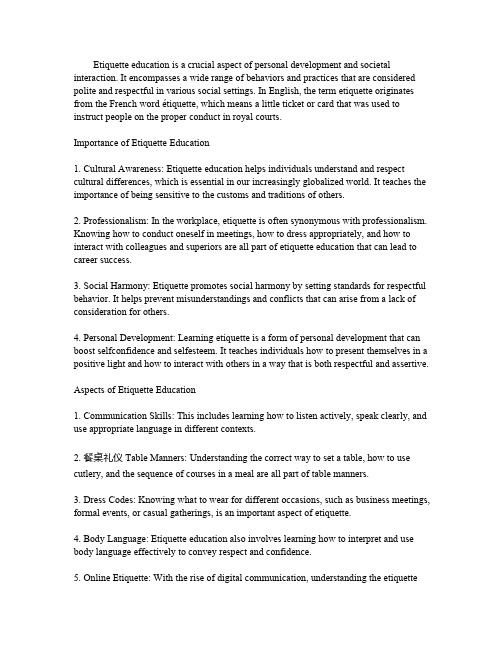
Etiquette education is a crucial aspect of personal development and societal interaction.It encompasses a wide range of behaviors and practices that are considered polite and respectful in various social settings.In English,the term etiquette originates from the French wordétiquette,which means a little ticket or card that was used to instruct people on the proper conduct in royal courts.Importance of Etiquette Education1.Cultural Awareness:Etiquette education helps individuals understand and respect cultural differences,which is essential in our increasingly globalized world.It teaches the importance of being sensitive to the customs and traditions of others.2.Professionalism:In the workplace,etiquette is often synonymous with professionalism. Knowing how to conduct oneself in meetings,how to dress appropriately,and how to interact with colleagues and superiors are all part of etiquette education that can lead to career success.3.Social Harmony:Etiquette promotes social harmony by setting standards for respectful behavior.It helps prevent misunderstandings and conflicts that can arise from a lack of consideration for others.4.Personal Development:Learning etiquette is a form of personal development that can boost selfconfidence and selfesteem.It teaches individuals how to present themselves in a positive light and how to interact with others in a way that is both respectful and assertive.Aspects of Etiquette Educationmunication Skills:This includes learning how to listen actively,speak clearly,and use appropriate language in different contexts.2.餐桌礼仪Table Manners:Understanding the correct way to set a table,how to use cutlery,and the sequence of courses in a meal are all part of table manners.3.Dress Codes:Knowing what to wear for different occasions,such as business meetings, formal events,or casual gatherings,is an important aspect of etiquette.4.Body Language:Etiquette education also involves learning how to interpret and use body language effectively to convey respect and confidence.5.Online Etiquette:With the rise of digital communication,understanding the etiquetteof online interactions,such as email communication and social media conduct,is becoming increasingly important.Teaching EtiquetteEtiquette education can be taught in various ways,including:RolePlaying:Simulating different social situations to practice etiquette. Discussions:Encouraging students to discuss the importance of etiquette and its impact on society.Observation:Watching and analyzing etiquette in action,such as during formal events or in media.Practice:Regularly practicing etiquette in everyday life to reinforce learning.ConclusionEtiquette education is not just about following rules its about understanding the underlying principles of respect,consideration,and empathy.It is a lifelong learning process that can greatly enhance ones social interactions and personal growth.As society evolves,so too does the understanding of etiquette,making it a dynamic and everrelevant subject of study.。
- 1、下载文档前请自行甄别文档内容的完整性,平台不提供额外的编辑、内容补充、找答案等附加服务。
- 2、"仅部分预览"的文档,不可在线预览部分如存在完整性等问题,可反馈申请退款(可完整预览的文档不适用该条件!)。
- 3、如文档侵犯您的权益,请联系客服反馈,我们会尽快为您处理(人工客服工作时间:9:00-18:30)。
1. 礼仪教育很ห้องสมุดไป่ตู้要
2. 现在许多大学生都不懂礼仪
3. 为加强礼仪教育,家长和学校应该……
【范文】
How to Enhance Etiquette Education?
Etiquette education, which plays an important role in moral education, has caught more and more people’s attention. Because it is an integral part of quality-oriented education and contributes to the construction of a harmonious society.
Regarding the seriousness of this phenomenon, I think we should take the following measures to arouse university students’ etiquette awareness. First, parents should set a good example for their children at home. Second, colleges should pay attention to students’ etiquette education and open some courses relating to etiquette, and they ought to try their best to create a good campus environment at the same time.
However, due to the lack of etiquette education in schools and families as well as the bad influence of the social environment, many college students have little knowledge of etiquette, thus it is quite common to see their bad behaviors. For example, they have no respect for their professors and the old, they talk to each other loudly in the library and don’t care about what they should wear in public places.
如何加强礼仪教育?
礼仪教育,道德教育中发挥着重要的作用,已经引起了人们越来越多的关注。因为它是素质教育的一个组成部分,有助于建设一个和谐的社会。
然而,由于在学校和家庭礼仪教育的缺乏以及社会环境的不良影响,许多大学生礼仪知识点,因此这是很常见的不良行为。例如,他们不尊重他们的教授和老,他们互相交谈在图书馆大声,不在乎他们应该在公共场所穿。
对于这一现象严重,我认为我们应该采取以下措施激发大学生礼仪意识。首先,家长要在家给孩子树立一个好榜样。第二,高校应重视大学生礼仪教育和开放的有关礼仪的课程,他们应该尽力同时营造良好的校园环境。
